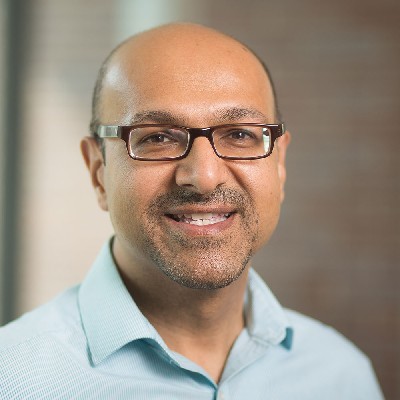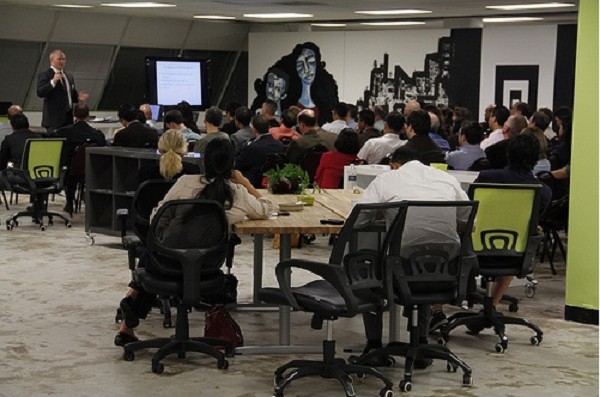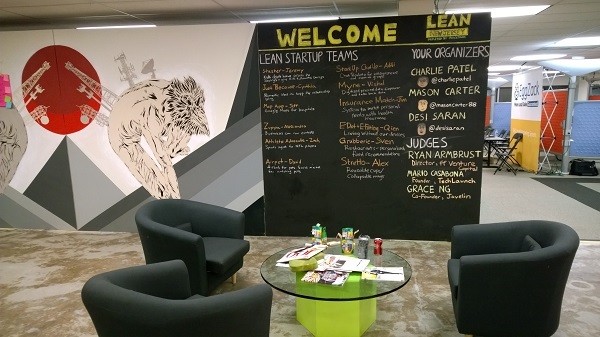After 5 Years, JuiceTank Closing Somerset Venue; End of One Chapter and Beginning of Another

Not the end of the dream but rather the evolution of a dream, says Mukesh Patel. JuiceTank to transition and reemerge in new forms in the future.
Some five years ago, give or take a couple of months, Somerset-based JuiceTank, one of New Jersey’s largest coworking spaces and tech incubators burst onto the New Jersey tech scene with a colorful vibrant space aimed at welcoming and supporting startup ventures.
Now the building in which JuiceTank resides has been sold, and founder Mukesh Patel is using this time to reevaluate, design a new plan, and figure out his next contribution to the New Jersey (and potentially national) technology entrepreneurship scene.
The startups currently based there have been notified, and JuiceTank is helping them negotiate leases with the new owners if they wish to remain at the same location. Patel is also trying to make contacts for them with other collaborative partners and coworking spaces, and is working to find more partners and other facilities for a potential launch of JuiceTank 2.0.
Patel noted that he was a principal, managing director and board member of the private equity (PE) fund that acquired the commercial building approximately six years ago, and had built the property management company that managed the building, among other assets. He was able to leverage strongly aligned relationships to create a flexible arrangement with the PE firm.
“We were very focused on providing a cost-effective workable plan with resources for startups. One way to do that was to make sure that the building ownership was on board with that vision and became a collaborative partner or supporter, as opposed to just a traditional landlord or service provider.”
Mukesh and his cousin Charlie Patel had developed and relied on this flexible and supportive arrangement when they launched JuiceTank in 2012. At the end 2016, however, it was time to make some changes. The PE fund that owned the building planned to exit the asset in 2017. “PE funds operate with term cycles consisting of a period of acquisitions, harvesting, growth and exits. They decided it was proper market timing and conditions to exit some of the commercial assets in Texas, New Jersey and some other states,” Mukesh Patel explained. From the equity firm’s point of view, it was a successful transaction.
“We had conversations with the new ownership group to explore opportunities, but to our disappointment, did not arrive at a mutually acceptable arrangement,” he continued. “Any appropriate arrangement requires a certain level of flexibility and partnership support, which are critical for building and supporting the startup ecosystem, especially coworking spaces and incubators. We believe in the concepts of innovative structured arrangements and partnerships with the social mission of supporting early stage startups. In comparison, most commercial ownership companies are more of a traditional landlord, which means setting the highest market terms and offering only long-term lease commitments.”

Coworking spaces typically operate on very flexible arrangements with their members, who work there to launch early-stage companies. “It didn’t make sense to be flexible on the membership side on one end, while having to sign a long-term commitment at select market terms at the other end,” Patel said.
“We respect and have a great relationship with the successor, but decided that it was in the best business judgment to make a change and vacate that location. I’m exploring the opportunity to potentially build “JuiceTank Version 2.0.” Furthering the theme of ‘new,’ I’m seeking new opportunities with new partners, new locations and new investors; and am envisioning a differentiated model.” Patel is in the process of starting that research, and is giving himself sufficient time to explore new opportunities for collaboration and to develop new strategic partnerships.
“I’m thinking bigger with Version 2.0. For the new plan and model to work at scale, the new business model would have to incorporate multiple locations, not only in New Jersey, but also in other states. Ideally, the concept would consist of a network of facilities with shared perks and amenities. However, that takes time. To do something on that scale could take a substantial amount of resources, including capital, talent, investors, sponsors, partnerships and so on.”

Patel is in the process of developing a new concept, “VX,” which hasn’t launched in the marketplace yet. He is building a team of partners, advisors and investors. And he’s developing a unique model of an advanced venture accelerator, including “co-venture” (collaborative ventures) deals to help growth-stage entrepreneurial ventures scale. “This isn’t an accelerator in the traditional sense, like a lot of the startup tech accelerators, but rather an accelerator for companies at a more advanced stage of entrepreneurial growth.
“At the end of the day, for economic development, if you help a bunch of startups grow to several employees each, or you help companies that were startups and now have progressed to growth companies, and you help them scale by an order of magnitude, you help create more jobs and opportunities.”
Patel is also bringing innovation to education: He teaches at Rutgers University and guest-lectures at universities nationally and globally to support the next generation of game changers and difference makers. He is also the director of innovation at the new Innovation Lab at the Honors College at Rutgers University–New Brunswick, where his team teaches social impact innovation, provides seed funding for student-founded social innovation startups, and helps those startups build everything from business models to advisory boards to prototypes to strategic partnerships.
He is also an adjunct professor at Rutgers Business School, in the undergraduate and the executive MBA programs, where he designs and teaches new experiential and interdisciplinary courses such as ICE – Innovation, Creativity & Entrepreneurship. He is the director of development and an adjunct Law Professor at the new Entrepreneurship Law Clinic at Rutgers Law School in Newark, working with Douglas Eakeley (Director of the Clinic and Law Professor) and Ted Weitz. In addition, as one of the Lead Faculties for Executive Education, he developed a new course based on design-thinking called “Innovation for Corporate Enterprises.” He led a team of faculty that brought “concepts from entrepreneurship into corporations,” and taught “how they can use intrapreneurial insights, strategies, frameworks and techniques to stay cutting-edge; innovate new products and services; attract and inspire talent (including millennials); and avoid disruption or, better yet, become the disrupter.”
Patel has also been an avid supporter of foundations, nonprofits and educational institutions that are based on entrepreneurial models. For instance, he was a former executive board member of New Jersey Business Innovation Network (NJBIN) at Rutgers; entrepreneur in residence and executive coach at the Black and Latino Tech Entrepreneurs’ Platform (BLT); a founding board member Ailanthus (Franklin Township), a new charter elementary school; and a committee chair at U Pitch New Jersey, a statewide university business pitch competition.
See Also:
JuiceTank — Innovation Lab, Accelerator and Coworking Space — Takes Shape in Somerset
Enthusiastic Entrepreneurs Get Hands-On Learning Experience at Lean Startup Machine New Jersey

